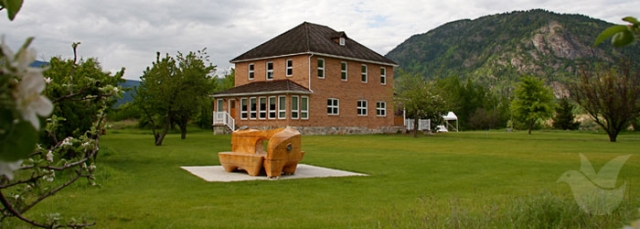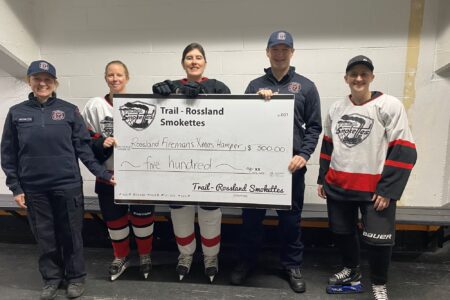Peace & Justice Studies Conference Brings Informal Evening with Bright Minds
His whole life revolves around missing and murdered Indigenous women. James Favel is the leader of the Bear Clan Patrol in Winnipeg. He revived the grass roots, peaceful street patrol group in his community in the summer of 2015 after growing frustrated at what he saw going on in his neighbourhood. It was the disappearance of Tina Fontaine that finally drove him to action.
“Looking out my window and seeing what I was seeing on my streets… I could either sit and do nothing or get up and do something,” he says. “When Tina Fontaine’s body was found, that was the last straw for me. I knew something more needed to be done.”
Lately, the Bear Clan model of citizen action is getting national attention and gaining momentum with other communities such as Kenora, Ontario and Regina, Saskatchewan. More are asking Favel for information.
“It’s taking off, just like a match to a fuse, it’s the right time for people,” says Favel. “People are tired of just talking and complaining. They want to see direct action and that is what Bear Clan is, direct action.”
“We are a peaceful, non-violent community policing model acting without judgement in harmony with our community,” he adds. “It brings peace to our community. We used to get up Saturday morning and look at the paper seeing who got shot, robbed for their beer. This is not happening as much anymore. We’re having an impact. We are interrupting the system that sees our people incarcerated, hospitalized or taken into care. We’re doing good that way too.”
Opportunity to Get Socially Engaged in Difficult Issues
Favel will be one of the discussion leaders appearing at a series of Peace Cafés held in downtown Nelson as part of the International Peace & Justice Studies Association (PJSA) Conference hosted by Selkirk College Sept. 22 to 24. The conference will involve more than 300 people and is open to academics, community organizers, researchers, public school educators, activists and the general public.
The Mir Centre for Peace at Selkirk College has been hosting Peace Cafés since 2010 and the conference allowed the perfect venue to open up space in Nelson’s core to invite more people to share in conversations that matter, says organizer and Mir Centre Chair Randy Janzen.
“It is an opportunity to get together with others to discuss these important issues with people who know what they are talking about,” says Janzen. “These things are on our minds and may preoccupy us. Peace Cafés allow us to get us out of our minds and away from the fear that can happen when our only thinking about this is processing the evening news.
“People will be hearing some music and having some beverages and food. This will lend itself to creating an environment where people are feeling social and engaged.”
Important Discussions for Our Times
The caliber of discussion leaders, and conference speakers overall, is exceptionally high. Dr. Sa’ed Atshan will be leading a discussion on the topic of “Gay and Middle Eastern in a Post-Orlando America.” Growing up gay in Palestine, he has firsthand experience with homophobia and is “passionate about contributing to the eradication of this social ill and system of oppression that is global in scope.”
Atshan is excited for the opportunity to engage with people in the community who may not have experience with the Peace & Justice Studies Association through the Peace Café. Breaking silences is important to him.
“The fact that many people in the US were utterly silent about Orlando, as if the largest attack on U.S. soil since 9-11 had not occurred, made many LGBTQ people feel like we were in the closet again,” he says.
The professor of peace and conflict studies at Swarthmore College in Pennsylvania believes in creating a safe space to share ideas on this sensitive subject matter in consideration of a wide range of beliefs.
“How we approach it must model the peace and justice we want to create in the world for everyone, without discrimination,” Ashtan says.
Dr. Michael Loadenthal is the PJSA new executive director and will host his own Peace Café helping to understand terrorism as an issue beyond state security and a political label applied to one who opposes state authority.
“This is a particularly troubling perspective because it prioritizes one kind of security over another. It doesn’t prioritize the types of security that makes up complex human society—security of basic human needs,” he says.
As an early scholar of social movements, Loadenthal was drawn to this issue on 9-11 when the high school senior was making decisions about his post-secondary education.
“I was thrust into a world of political and social movements beyond my own border and I was exposed to a wide variety of non-state actors that weren’t familiar to me,” says Loadenthal, who now holds a Ph.D. in Conflict Analysis and Resolution, a master’s degree in Terrorism Studies and a dual BA in International Peace & Conflict Resolution, and Women & Gender Studies.
In his new role with PJSA, he welcomes the public to become part of the discussion by taking part in Peace Cafés and the conference as a whole.
“For people in the area who may not be professional academics, may have never done work with PJSA, this is a great opportunity for them to get caught up rapidly in what is the cutting edge of this field—the study of peace and justice—and also have an impact on that field. I like to think of it as a bidirectional relationship,” says Loadenthal. “We hope to be trend setting as well as aware of what is going on around us.”
Find out more about the Peace & Justice Studies Conference and the speakers who will be featured at the Peace Cafés at selkirk.ca/event/peace-justice-studies-conference.
























